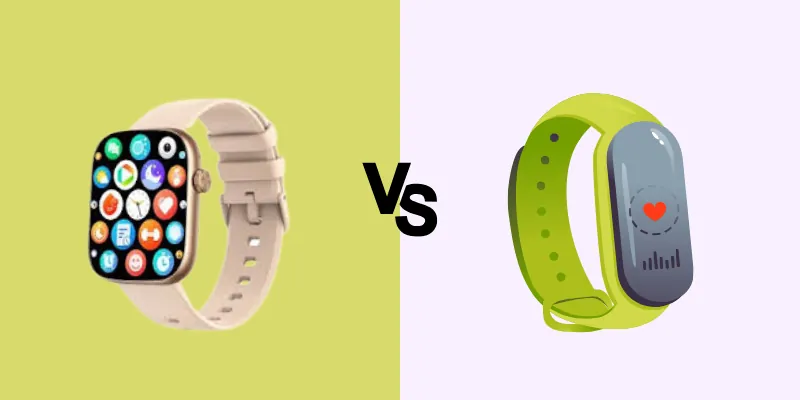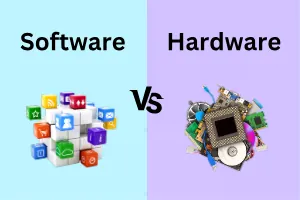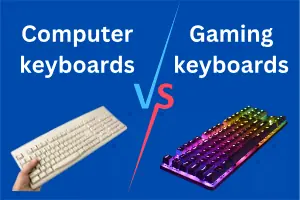Smartwatches vs Fitness Tracker: Which Wearable Matches Your Life?
Published: 14 Oct 2024
In recent years, wearable technology has gained immense popularity, with Smartwatches and fitness trackers being at the forefront.
While both devices share similarities in terms of being worn on the wrist and offering various functionalities, they serve different purposes and cater to distinct user needs.

In this article, we will explore the key differences between smartwatches and fitness trackers, helping you choose the right device based on your lifestyle and requirements.
Here is the list of Smartwatches vs Fitness Tracker:
- Functionality
- Design and Display
- Battery Life
- Price Range
- User Target and Lifestyle
- Health and Fitness Features
- App Ecosystem
- Compatibility with Smartphones
- Water Resistance and Durability
Let’s talk about Smartwatches vs Fitness Tracker in details:
1. Functionality:
Smartwatches: Smartwatches are designed to be an extension of your smartphone. They offer a wide range of functionalities beyond fitness tracking.
Smartwatches can display notifications, allow you to make and receive calls, send messages, access social media, control music playback, and run various applications.
They provide a comprehensive suite of features that serve to productivity, communication, entertainment, and health and fitness.

Fitness Trackers: Fitness trackers, as the name suggests, primarily focus on monitoring health and fitness-related metrics. They track steps taken, distance traveled, calories burned, heart rate, sleep patterns, and sometimes even blood oxygen levels.
Fitness trackers provide detailed insights into your physical activity and help you set and achieve fitness goals. While some fitness trackers offer basic smartwatch-like features such as displaying notifications, their primary focus is on health and fitness tracking.
2. Design and Display:
Smartwatches: Smartwatches often feature a more huge and versatile design. They come in various shapes, sizes, and materials, allowing for customization and personalization.
Smartwatches typically have color touchscreens and offer a big range of watch faces to choose from. Their displays are vibrant and interactive, providing easy access to apps, notifications, and other functions.
Fitness Trackers: Fitness trackers are usually more compact and lightweight compared to smartwatches. They prioritize functionality and simplicity over flashy designs.
Fitness trackers typically have monochrome or limited-color displays that focus on providing essential health and fitness information.
Some fitness trackers feature smaller screens or use LED lights to indicate progress or notifications. The emphasis is on providing a clear and concise display for fitness data.
3. Battery Life:
Smartwatches: Smartwatches generally have shorter battery life compared to fitness trackers due to their additional features and power-hungry components.
Depending on usage and settings, smartwatches usually need to be charged every one to three days. However, advancements in technology have led to improvements in battery life, and some smartwatches can last up to a week or more on a single charge.
Fitness Trackers: Fitness trackers are designed with energy efficiency in mind, mainly focusing on health and fitness tracking. As a result, they typically have longer battery life compared to smartwatches.
Depending on the model and usage, fitness trackers can last anywhere from several days to several weeks on a single charge. Some fitness trackers even offer month-long battery life, thanks to their simplified functionality.
4. Price Range:
Smartwatches: Smartwatches tend to be more expensive compared to fitness trackers due to their broader range of features and capabilities.
Depending on the brand, model, and additional functionalities, smartwatches can range from mid-range to high-end prices. The cost of smartwatches is influenced by factors such as display quality, build materials, processing power, and software capabilities.

Fitness Trackers: Fitness trackers are generally more affordable compared to smartwatches. Their focus on fitness tracking and fewer features allows for a lower price point.
Fitness trackers are available at various price ranges, from budget-friendly options to mid-range models with additional features. The cost of fitness trackers is influenced by factors such as display type, sensor accuracy, durability, and brand reputation.
5. User Target and Lifestyle:
Smartwatches: Smartwatches are suitable for individuals who want a versatile device that goes beyond fitness tracking. They are ideal for tech-savvy users who desire a seamless integration between their smartphones and wearable devices.
Smartwatches are popular among busy professionals, frequent travelers, and those who want quick access to communication, productivity tools, and entertainment on their wrists.
Fitness Trackers: Fitness trackers are tailored for individuals who prioritize health and fitness monitoring. They are ideal for fitness expert, racer, and those who want to maintain an active lifestyle.
Fitness trackers provide detailed insights into physical activity, sleep patterns, and overall health. They are especially useful for tracking progress, setting goals, and maintaining motivation for achieving fitness targets.
6. Health and Fitness Features:
Smartwatches: Smartwatches typically provide a broader range of health metrics, including heart rate monitoring, GPS tracking, blood oxygen level measurement, and stress tracking. Some smartwatches also offer advanced features like electrocardiogram (ECG) readings.

Fitness Tracker: Fitness trackers, focus primarily on basic fitness metrics such as steps, distance, calories burned, and sleep patterns. They may not have as many advanced health tracking features as smartwatches.
7. App Ecosystem:
Smartwatches: Smartwatches often have access to a wide range of apps and app ecosystems, allowing you to extend the functionality of your device.
You can find apps for productivity, communication, social media, music streaming, and more. The availability of third-party apps gives smartwatches the flexibility to adapt to your specific needs and interests.
Fitness Tracker: Fitness trackers, while they may have some app integrations, generally have a more limited app ecosystem. The importance is primarily on the dedicated fitness and health tracking functionalities.
8. Compatibility with Smartphones:
Smartwatches: Usually compatible with both iOS and Android smartphones, though some brands may be limited to one ecosystem (like Apple Watch with iPhones).

Fitness Tracker: Most fitness trackers are compatible with both Android and iOS, though the range of features might differ slightly depending on the phone type.
9. Water Resistance and Durability:
Smartwatches: Many models offer water resistance but may be more at risk due to their large screens.
Fitness Tracker: Typically more durable and water-resistant, often designed to be worn during workouts, including swimming.
Conclusion:
In conclusion, Smartwatches and Fitness trackers offer distinct functionalities and cater to different user needs. Smartwatches provide a comprehensive range of features beyond fitness tracking, serving as a wrist-worn extension of your smartphone.
Fitness trackers, on the other hand, focus primarily on health and fitness monitoring, offering detailed insights into activity levels and overall well-being. By considering your lifestyle, preferences, and priorities.
You can make an informed decision about whether a smartwatch or a fitness tracker is the right wearable device for you.
FAQs about Smartwatches and Fitness Tracker:
Here are some of the most FAQs related to Smartwatches and Fitness Tracker:
A fitness tracker is primarily focused on tracking health-related data like steps, heart rate, sleep, and activity levels.
A smartwatch offers fitness tracking as well but also provides additional features like notifications, apps, GPS, music control, and sometimes calling or texting, making it a more multifunctional device.
Fitness trackers are generally better for those focused solely on health and fitness tracking due to their simplicity, longer battery life, and often more specialized features like advanced sleep tracking.
However, smartwatches can offer more comprehensive tracking combined with additional features, making them versatile for both fitness and general use.
Typically, fitness trackers have better battery life than smartwatches due to their simpler displays and more focused functionality.
Fitness trackers can last several days to weeks on a single charge, whereas smartwatches usually need to be charged every 1-2 days because of their advanced features and more power-intensive displays.
Some fitness trackers offer basic smartwatch features like notifications, call alerts, and limited app functionality, but they are generally more limited compared to a full-fledged smartwatch.
For users who want simple notifications along with fitness tracking, high-end fitness trackers might suffice.
Smartwatches tend to be more expensive than fitness trackers due to their broader range of features, including app integration, larger screens, and more powerful processors.
Fitness trackers are generally more affordable, catering to those who primarily want health and fitness tracking features.
Smartwatches are generally more stylish and customizable for casual wear.
No, fitness trackers do not typically support call-making features like smartwatches.
Yes, you can make calls on an Smartwatch.

- Be Respectful
- Stay Relevant
- Stay Positive
- True Feedback
- Encourage Discussion
- Avoid Spamming
- No Fake News
- Don't Copy-Paste
- No Personal Attacks

- Be Respectful
- Stay Relevant
- Stay Positive
- True Feedback
- Encourage Discussion
- Avoid Spamming
- No Fake News
- Don't Copy-Paste
- No Personal Attacks





